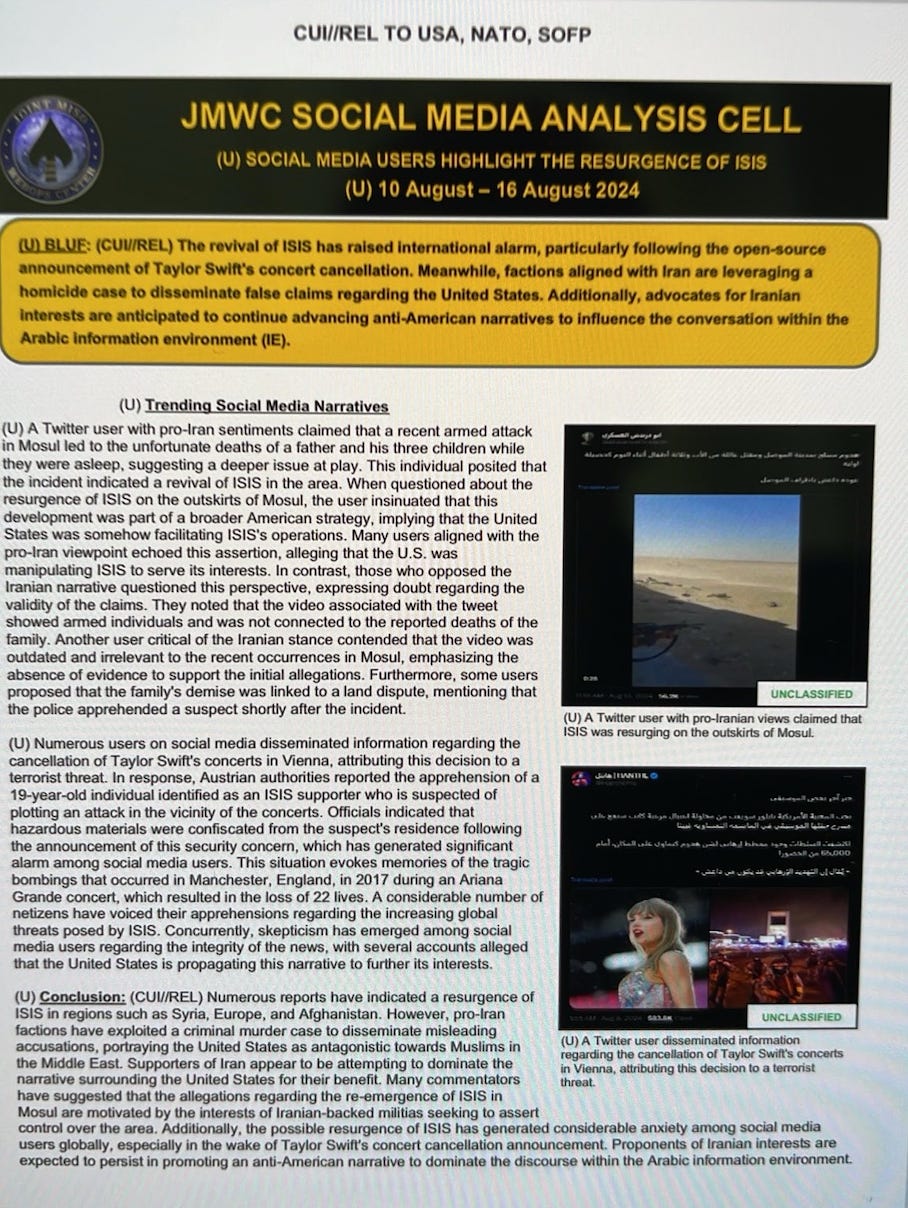Why Taylor Swift Is in a Pentagon Intelligence Report
From the Tortured Intelligence Department
U.S. intelligence has discovered that there is “considerable anxiety among social media users” following Taylor Swift’s concert cancellation due to the alleged threat of an attack by ISIS, according to an intelligence report I obtained. And not just social media users at large. The report follows social media sentiment in the Arab world. This is what American spies are wasting their time on.
The military intelligence report was produced by Special Operations Command’s social media analysis cell earlier this month. On August 7, the widely popular singer canceled her appearance in Vienna due to a warning that the Afghanistan-based branch of ISIS might attack the venue.
In other words, the Pentagon’s secretive special ops command has a team whose job it is to doomscroll Twitter on a macro scale. In a weekly update, the intelligence report includes a chart depicting a spike in the number of Arabic-language mentions of Taylor Swift following the concert cancellation. “A considerable number of netizens,” the intelligence report says, employing an informal term for internet users that I haven’t heard in a decade, “have voiced their apprehensions regarding the increasing global threats posed by ISIS.” This conclusion is the result of U.S. intelligence collecting and analyzing huge quantities of social media content across numerous platforms.
The organization that produced the report, the Joint Military Information Support Operations Web Operations Center (JMWC), was established in 2019. Military Information Support Operations, or MISO, is the Pentagon’s kinder, gentler term for psychological operations (psyops). JMWC’s mission is twofold, and includes coordinating U.S. “MISO conducted via the internet,” as well as “counter[ing] hostile propaganda and disinformation,” as the Pentagon told Congress last year. (Usage tip: when we do it, it’s called “MISO”; when our adversaries do it, it’s called “propaganda and disinformation.”)
In the testimony to Congress, the Pentagon also said that MISO activities to counter strategic competitors — i.e., China, Russia, Iran — had more than tripled over the past three years. In the case of Iran, that means monitoring social media for narratives that might be used to undermine Tehran’s influence in the region.
The focus on Iran is clear in the intelligence report. It starts by singling out a “pro-Iran” Twitter user for “implying that the United States was somehow facilitating ISIS’ operations,” noting that “many users aligned with the pro-Iran viewpoint echoed” that view. Thus the report concludes:
“Proponents of Iranian interests are expected to persist in promoting an anti-American narrative to dominate the discourse within the Arabic information environment.”
Iran promotes anti-American narratives? You’re kidding!
It’s not clear why a detailed report is necessary to surmise the geopolitical equivalent of “water is wet.” It’s even less clear why the report is secret from the public, stamped “controlled unclassified information.” A Pentagon inspector general evaluation of the center’s effectiveness found that the team lacked clear policy and oversight. That would explain pointless busywork like this report, though it’s hard to know what exactly the watchdog report is referring to since the full evaluation is classified. (You’re invited to file a FOIA request for a redacted copy of the report, which I expect they’d produce sometime during the Barron Trump administration in 2060.)
Strange as this all may seem, the report is typical for not just the center that produced it, but the national security state’s efforts (read: obsession) with “disinformation” more generally. The U.S. government’s counter-disinformation efforts span the FBI, Department of Homeland Security, State Department and, as we’ve now seen, the Pentagon — and this is just one of dozens of military teams involved in it. So vast is the war on disinformation that the government created an organization within the intelligence community to oversee it all, called the Foreign Malign Influence Center. All of these social media sentiment monitoring programs are largely shielded from public ridicule thanks to their being cloaked in official secrecy.
That is, unless you leak them to me.1
— Edited by William M. Arkin
You can reach me securely via Signal at 202-510-1268







What an outstanding pointless do nothing job. “Yea, boss the Iranians are doing a lot of anti-American stuff on social media. It will be in my report ‘Why Hunter’s Hog Could Destablize the Western World.’”
Water isn't wet.